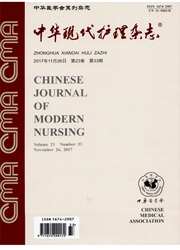

 中文摘要:
中文摘要:
目的通过评估及满足脑卒中照顾者的需求,提高脑卒中照顾者照顾能力,为脑卒中患者出院准备服务系统的建立提供依据。方法2011年7—12月将烟台毓璜顶医院接受治疗的100例脑卒中患者纳入调查,按照单双住院号分为干预组(50例)与对照组(50例),对照组进行常规护理,干预组在此基础上,根据出院准备计划分别在人院后24h内、出院前1周、出院后1周使用脑卒中照顾者需求问卷对脑卒中照顾者进行评估,根据照顾者需求情况进行有针对性干预,干预后使用照顾者能力评估问卷进行评价,比较两组在患者出院后2周照顾者的照顾能力。结果入院时两组脑卒中患者的照顾者的照顾能力比较,差异无统计学意义(P〉0.05),出院后2周干预组照顾者在知识(9.80±0.40)、决策(6.80±0.40)、行为(8.20±0.76)、综合(24.80±0.98)4个照顾能力维度得分均高于对照组的(5.22±1.36),(3.83±1.39),(6.09±1.17),(15.14±3.13),两组比较,差异有统计学意义(t值分别为1.14,1.08,2.24,1.69;p〈0.05)。结论落实出院准备服务,评估及满足脑卒中照顾者的需求可以提高照顾者的照顾能力。
 英文摘要:
英文摘要:
Objective To explore the effect of meeting family caregivers of stroke patients' needs and enhance their care ability so as to provide basis for discharge planning system. Methods Totals of 100 caregivers of stroke survivors were enrolled in this study and divided into two groups with 50 cases in each group. The control group was given routine care, and the intervention group was assessed with questionnaire within 24 hours when admitted to hospital, at one week before discharge and one week after discharge, respectively. Intervention were performed as caregivers' needs, two groups' ability were compared at two weeks after discharge. SPSS 16.0 was used to analyze the data. Results There was no significant difference between two groups in needs and ability when admitted to hospital ( P 〉 0.05 ). The ability of intervention group have been significantly improved than that of control group after educated at two weeks after discharge in knowledge [ ( 9.80 ± 0.40) vs (5.22 ± 1.36 ) ], decision-making [ (6.80 ± 0.40) vs ( 3.83 ± 1.39 ) ], behavior [ ( 8.20 ± 0.76) vs (6.09±1.17)], comprehensive [(24.80 ±0.98) vs (15.14 ±3.13)](t=1.14,1.08,2.24, 1.69, respectively ; P 〈 0.05 ) ]. Conclusions Meeting caregivers of stroke survivors needs can improve their ability in care.
 同期刊论文项目
同期刊论文项目
 同项目期刊论文
同项目期刊论文
 期刊信息
期刊信息
